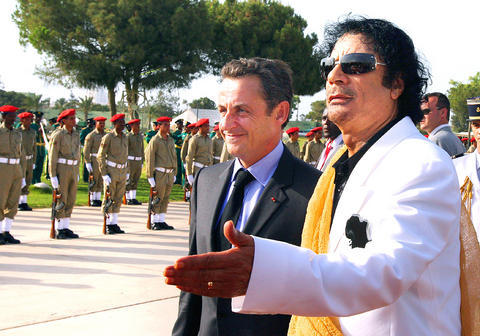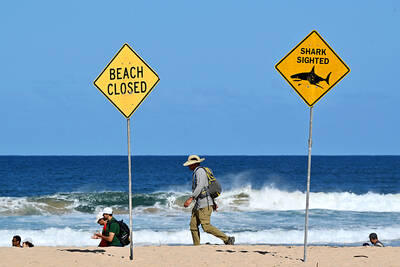France and Libya on Wednesday inked a deal on the building of a nuclear reactor for water desalination during talks between Libyan leader Muammer Qaddafi and French President Nicolas Sarkozy, a day after the release of six foreign medics.
Sarkozy had touted his visit of less than 24 hours as a "political trip" to help Libya's reintegration into the international community after decades of sanctions and isolation.
Soon after his late afternoon arrival in Tripoli, Sarkozy and his delegation including French Foreign Minister Bernard Kouchner were accorded an official welcome at Qaddafi's Bab Azizia palace.

PHOTO: AFP
Qaddafi and Sarkozy then went into talks while Kouchner and his Libyan counterpart, Abdel Rahman Shalgham, signed a raft of agreements, including a memorandum of understanding to build a Libyan nuclear reactor for water desalination.
The agreement "aims to furnish Libya with a nuclear reactor that makes it possible to meet one of its important needs -- a supply of drinking water," French presidential aide Claude Gueant told reporters at the signing ceremony.
"Drinking water is rare in Libya, so the aim is to allow the desalination of sea water" using nuclear energy, Gueant added.
The two ministers also signed accords relating to military-industrial cooperation, cultural, scientific and technical assistance and cooperation in the field of research, officials said.
The deals came a day after Tripoli's release of six foreign medics held in Libya since 1999 and whose death sentence for infecting children with the AIDS virus was commuted.
Asked if the deals had been linked to the release of the the five Bulgarian nurses and a Palestinian-born doctor, Gueant replied, "No, not at all."
Gueant, along with Sarkozy's wife Cecilia, joined EU officials in Tripoli earlier in the week to press Libya to release the medics, held since 1999.
The medics were flown to Sofia on Tuesday aboard a French government jet after being released by the Libyan authorities. They were then granted a pardon by Bulgarian President Georgy Parvanov, ending an eight-year ordeal.
The pardons were angrily condemned by the Libyan government, which on Wednesday delivered a formal protest to senior Bulgarian diplomat in Tripoli complaining of what it said was Sofia's non-compliance with an extradition treaty signed between the two countries in 1984.
Some observers saw Sarkozy's determination to see the medics released as evidence he wants to boost ties with oil-rich Libya.
He and his wife, however, were accused in the European press of stealing the credit after EU negotiator Benita Ferrero-Waldner had done much of the hard bargaining.
Britain's Times newspaper pointed out that the release of the medics was likely to lead to "lucrative contracts for French companies with the oil-rich African state."
Many papers slammed EU negotiators for folding to "blackmail" and paying "blood money."

With much pomp and circumstance, Cairo is today to inaugurate the long-awaited Grand Egyptian Museum (GEM), widely presented as the crowning jewel on authorities’ efforts to overhaul the country’s vital tourism industry. With a panoramic view of the Giza pyramids plateau, the museum houses thousands of artifacts spanning more than 5,000 years of Egyptian antiquity at a whopping cost of more than US$1 billion. More than two decades in the making, the ultra-modern museum anticipates 5 million visitors annually, with never-before-seen relics on display. In the run-up to the grand opening, Egyptian media and official statements have hailed the “historic moment,” describing the

SECRETIVE SECT: Tetsuya Yamagami was said to have held a grudge against the Unification Church for bankrupting his family after his mother donated about ¥100m The gunman accused of killing former Japanese prime minister Shinzo Abe yesterday pleaded guilty, three years after the assassination in broad daylight shocked the world. The slaying forced a reckoning in a nation with little experience of gun violence, and ignited scrutiny of alleged ties between prominent conservative lawmakers and a secretive sect, the Unification Church. “Everything is true,” Tetsuya Yamagami said at a court in the western city of Nara, admitting to murdering the nation’s longest-serving leader in July 2022. The 45-year-old was led into the room by four security officials. When the judge asked him to state his name, Yamagami, who

DEADLY PREDATORS: In New South Wales, smart drumlines — anchored buoys with baited hooks — send an alert when a shark bites, allowing the sharks to be tagged High above Sydney’s beaches, drones seek one of the world’s deadliest predators, scanning for the flick of a tail, the swish of a fin or a shadow slipping through the swell. Australia’s oceans are teeming with sharks, with great whites topping the list of species that might fatally chomp a human. Undeterred, Australians flock to the sea in huge numbers — with a survey last year showing that nearly two-thirds of the population made a total of 650 million coastal visits in a single year. Many beach lovers accept the risks. When a shark killed surfer Mercury Psillakis off a northern Sydney beach last

‘CHILD PORNOGRAPHY’: The doll on Shein’s Web site measure about 80cm in height, and it was holding a teddy bear in a photo published by a daily newspaper France’s anti-fraud unit on Saturday said it had reported Asian e-commerce giant Shein (希音) for selling what it described as “sex dolls with a childlike appearance.” The French Directorate General for Competition, Consumer Affairs and Fraud Control (DGCCRF) said in a statement that the “description and categorization” of the items on Shein’s Web site “make it difficult to doubt the child pornography nature of the content.” Shortly after the statement, Shein announced that the dolls in question had been withdrawn from its platform and that it had launched an internal inquiry. On its Web site, Le Parisien daily published a